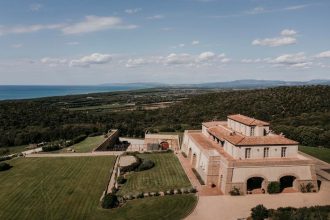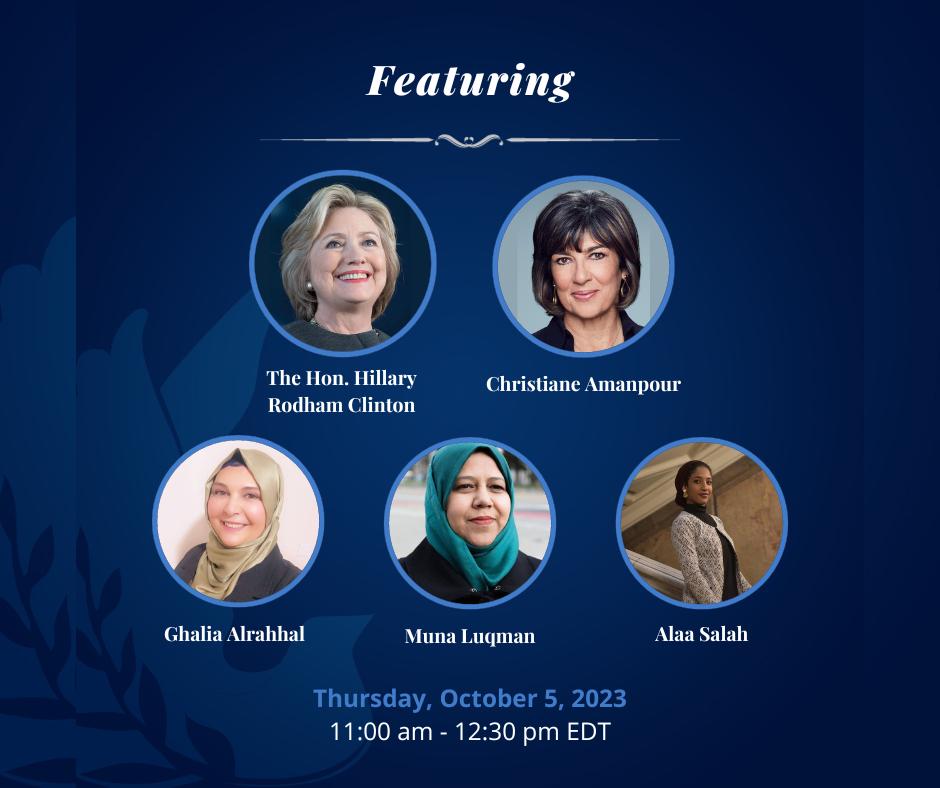“I did not come here to accept only this award,” Muna Luqman began. “I came here to seek justice and peace for the Yemeni people, for the war, for the military confrontations, and the economic collapse that happened, and that, unfortunately, the U.S. was part of.” Luqman is Founder and Executive Director of Food4Humanity in Yemen, and Co-Founder of the Women’s Solidarity Network and a Peace and Security Strategist. She spoke these words as one of four recipients of the Hillary Rodham Clinton 2023 Award from the Georgetown Institute For Women, Peace and Security (GIWPS).
As I watched breaking news of the horrendous, multipronged, surprise attack on Israel by Hamas Saturday morning, killing hundreds of Israelis – and that Hamas is holding Israelis hostage – I thought of these women peace activists and of the innocent women of Israel and the Palestinian Territories, caught in the middle and suffering.
“Currently, what we are seeing as challenges on the ground are immense. I might maybe just mention maybe a few. For the humanitarian side, we are seeing the obstruction of aid,” that aid is being diverted to the armed groups, Luqman explained after receiving the award, which “is depriving women and children of very needed aid.” Adding, “I think one of the major challenges that as a peace builder that I’ve had also and my colleagues, is the protection of human rights defenders and, people who are really trying to bring the real narrative, and the stories of the real people on the ground.”
Luqman’s fellow Hillary Rodham Clinton 2023 Awardees are: Christiane Amanpour, Chief International Anchor for CNN and Host of “Amanpour” on PBS; Alaa Salah, a Sudanese Democracy Activist, Civil Society Leader and Human Rights Activist; and Ghalia Alrahhal, Executive Director of the Mazaya Organization for Women’s Development and Human Rights Defender, Syria. The awards were presented on Thursday, October 5, 2023 at Georgetown University by the GIWPS Executive Director, Ambassador Melanne Verveer, Secretary Clinton and Georgetown University President John DeGioia.
Women are much more at risk in war “simply because of their gender” – and severely under-reported
Global Citizen reports that women are at the greatest risk in war and violent conflict. “Simply because of their gender, women and girls caught in the middle of war experience sexual violence, physical and verbal abuse, and barriers in accessing resources and having their human rights met; this is of course all on top of being directly exposed to conflict on the front lines and facing life-threatening conditions.” UN Women reports the same, and that, “Attacks against women human rights defenders are extremely under-reported and anonymized in official United Nations statistics.”
These women are fighting these trends, putting their own lives and their families at great risk.
“On April the eighth, 2019, as the protests (in Sudan) dramatically grew, Alaa stood atop a car, draped in a white robe, and captivated the world’s attention with her powerful presence. She came to be known as Lady Liberty of the Sudanese Revolution. The iconic photograph depicted Allah as a beacon of hope,” Verveer said introducing Alaa Salah and why she’s receiving this award. “Through her courage and determination, Allah has galvanized not only her fellow citizens, but also the global community. Her influence has extended beyond her own generation, inspiring countless individuals, especially Sudanese women, to rise in demand their rightful place in shaping the course of their nation.”
“Ghalia Alrahhal’s journey from an arranged teen marriage in a town in Idlib, Syria, to becoming a transformative leader in women’s empowerment and peace advocacy exemplifies the remarkable impact an individual can have in shaping a more just society,” is how Verveer began Alrahhal’s story. “At the outset, she engaged in relief work, coordinating efforts to bring essential medicines to cities ravaged by conflict,” and then converted her hair salon into a meeting place for women called Mazaya. “It was the first women’s empowerment organization to provide vocational training, educational courses, skills development.”
Alrahhal expanded her centers into other communities, even in the face of death threats, harassment, abuse and violent attacks, including the death of her son from a bullet. “She founded the Syrian women’s political movement with others to provide women with the political awareness and tools to engage in peace talks over her country’s future, and to strengthen their representation at the time in UN-backed negotiations to end the war.” Ghalia Alrahal could not leave Syria to accept the award, so she sent a video.
“The biggest challenge is men starting wars.”
In response to a question a Georgetown student submitted about what the biggest challenge is to women’s peace and security over the next 10 years, Secretary Clinton said, “I think the biggest challenge is men starting wars. And I don’t think they have enough to do.” After the applause that followed, she added, “When men fight for a long time, it’s what they know to do. Governing is really hard. Making decisions about how you’re going to get food to people, get agriculture going, get healthcare provided, open up schools, that takes a lot of work.”
Secretary Clinton – and Christianne Amanpour, when she received her award at that event – emphasized the need for more women’s voices in the most pressing challenges of the day. “There are some incredibly powerful forces at work around the world. Some of them like climate change, which we are seeing unfold in real time before our eyes.”
From war to artificial intelligence, to the fight for democracy, Clinton pointed out that, “These forces impact every one of us, but they do disproportionately impact women. It’s no surprise that the drive to diminish women’s rights is actually linked to the quest for political power. Many leaders use women as a reason for pulling back on rights, use women’s lives and aspirations as a challenge rather than an opportunity to existing power structures,” and she emphasized that is why it’s so critical to keep telling women’s stories and celebrating women’s efforts.
We need more women’s stories on the front lines – “be truthful not neutral”
“It’s imperative that we have women’s perspectives in journalism, just as we must have in national security and diplomacy. We need to hear stories about what’s actually happening in people’s real lives,” Secretary Clinton insisted, adding, “Women are agents of change, and women’s stories are powerful reminders of what is possible.”
To tell those stories, Christianne Amanpour shared her mantra, “be truthful not neutral,” because there not equal sides in these situations. “We have to be truthful, not neutral. What’s happening on one side of an aisle, wherever it might be, let’s say, to destroy democracy, is exactly not what’s happening and not equal to those who are trying to defend it.”
For lessons in resilience from the women of Ukraine, read my Forbes article here.
Read the full article here





